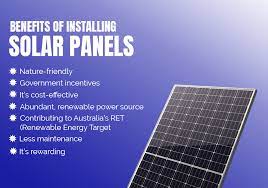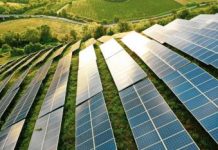Harnessing the Sun:The Remarkable Benefits of Solar Panels in Homes
In an era where sustainability and energy efficiency are at the forefront of environmental concerns, the adoption of solar panels in homes has become increasingly popular. Homeowners across the globe are embracing the power of the sun to not only reduce their electricity bills but also to make a positive impact on the environment. In this article, we’ll explore the incredible benefits of solar panels in homes, from financial advantages to the preservation of our planet.
Why Solar Panels?
Solar panels, also known as photovoltaic (PV) panels, have emerged as a game-changer in the residential energy landscape. They are designed to capture sunlight and convert it into clean, renewable electricity for household use. The reasons for their widespread adoption are both compelling and multifaceted.

Financial Advantages
One of the primary driving forces behind the adoption of solar panels in homes is the financial benefits they offer. Installing solar panels can significantly reduce your monthly electricity bills, providing a tangible and ongoing return on investment (ROI). By harnessing the power of the sun, homeowners can generate their electricity, thus decreasing their reliance on conventional utility providers.
Environmental Impact
Beyond the financial incentives, the environmental impact of solar panels cannot be overstated. The utilization of solar energy significantly reduces carbon emissions and lessens our reliance on fossil fuels, contributing to a greener and more sustainable planet. By opting for solar panels, homeowners play an active role in reducing their carbon footprint and preserving natural resources for future generations.
Energy Independence
Solar panels offer homeowners a degree of energy independence that is both empowering and practical. By generating their electricity, homeowners are less susceptible to the fluctuations in utility costs and the impact of power outages. This independence not only provides peace of mind but also contributes to a more resilient household.
Technological Advancements
Advancements in solar panel technology have made this renewable energy source more efficient and affordable than ever. Solar panels have evolved to capture sunlight more effectively, even in cloudy conditions, and require less maintenance. This means that modern solar panel systems provide higher energy yields and longer lifespans, making the investment even more attractive.
Installation and Maintenance
The installation process of solar panels has become increasingly streamlined and efficient. Skilled professionals can set up the system on residential rooftops with minimal disruption. Additionally, maintenance requirements are relatively low, primarily consisting of periodic inspections and cleaning. Ensuring that your solar panels function optimally is not a time-consuming or costly endeavor.
Solar Panel ROI
When considering the installation of solar panels, one of the most critical factors for homeowners is the return on investment (ROI). Solar panels offer long-term financial benefits that often outweigh the initial investment. By producing your electricity and potentially feeding excess energy back into the grid, homeowners can enjoy significant savings over the years.
Common Concerns
Before making the decision to invest in solar panels, it’s essential to address some common concerns that homeowners may have. These concerns include the upfront cost of installation, the weather dependency of solar panels, and aesthetic considerations. We’ll provide answers and insights to help homeowners make informed choices.
Solar Panel Incentives
The adoption of solar panels is further incentivized by a range of government and industry incentives. These incentives can significantly reduce the upfront cost of installation. We’ll discuss tax credits, rebates, and financing options available to homeowners, making the transition to solar power more affordable and accessible.
FAQs About Solar Panels in Homes
Q: What are solar panels, and how do they work?
A: Solar panels, also known as photovoltaic panels, capture sunlight and convert it into electricity using semiconductor materials. When sunlight hits the panels, it creates an electric current, generating clean, renewable energy for your home.
Q: Are solar panels only for sunny regions?
A: Solar panels are not limited to sunny regions. They can generate electricity even on cloudy days. While sunlight is optimal, modern panels are designed to work efficiently in various weather conditions.
Q: How much do solar panels cost to install in a home?
A: The cost of solar panel installation varies based on factors like the size of your system and your location. On average, residential solar panel installations can range from $10,000 to $30,000 before incentives and rebates.
Q: What are the financial benefits of solar panels in homes?
A: Solar panels can significantly reduce your monthly electricity bills, potentially allowing you to save thousands of dollars over their lifespan. Additionally, many areas offer tax incentives and rebates to lower the initial cost.
Q: How long do solar panels last, and what is their maintenance like?
A: Solar panels typically have a lifespan of 25 to 30 years or more. Maintenance is minimal and includes occasional cleaning and inspections to ensure optimal performance.
Q: Do solar panels work during power outages?
A: Solar panels can work during power outages if you have a battery storage system in place. This allows you to store excess energy generated during the day for use during outages.
Q: Will installing solar panels increase my property value?
A: Yes, studies show that homes with solar panels tend to have higher property values. Potential buyers appreciate the energy cost savings and environmental benefits.
Q: Are there government incentives for installing solar panels?
A: Many governments offer incentives such as tax credits and rebates to encourage solar panel adoption. Check with local authorities and federal programs to see what’s available in your area.
Q: Are there financing options available for solar panel installations?
A: Yes, there are financing options, including solar loans and power purchase agreements (PPAs), which can make solar panel installations more affordable for homeowners.
Q: How can I determine if my home is suitable for solar panels?
A: An assessment by a solar panel professional can help determine your home’s suitability. Factors like roof condition, orientation, shading, and local regulations are considered in this evaluation.
Conclusion
In conclusion, solar panels in homes offer a myriad of benefits that extend far beyond cost savings. By harnessing the power of the sun, homeowners not only reduce their electricity bills but also play a crucial role in mitigating climate change and securing a sustainable energy future. The financial advantages, combined with the positive environmental impact, make solar panels a wise investment for those looking to embrace a greener and more self-sufficient lifestyle.




